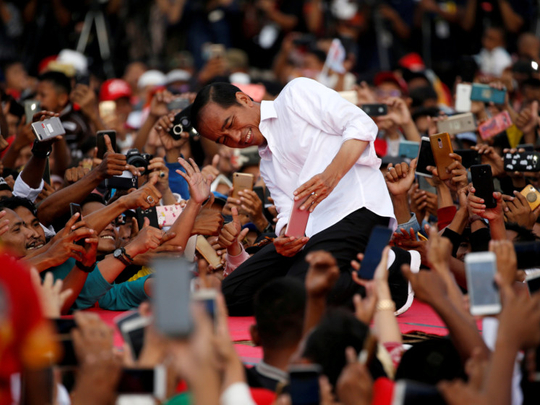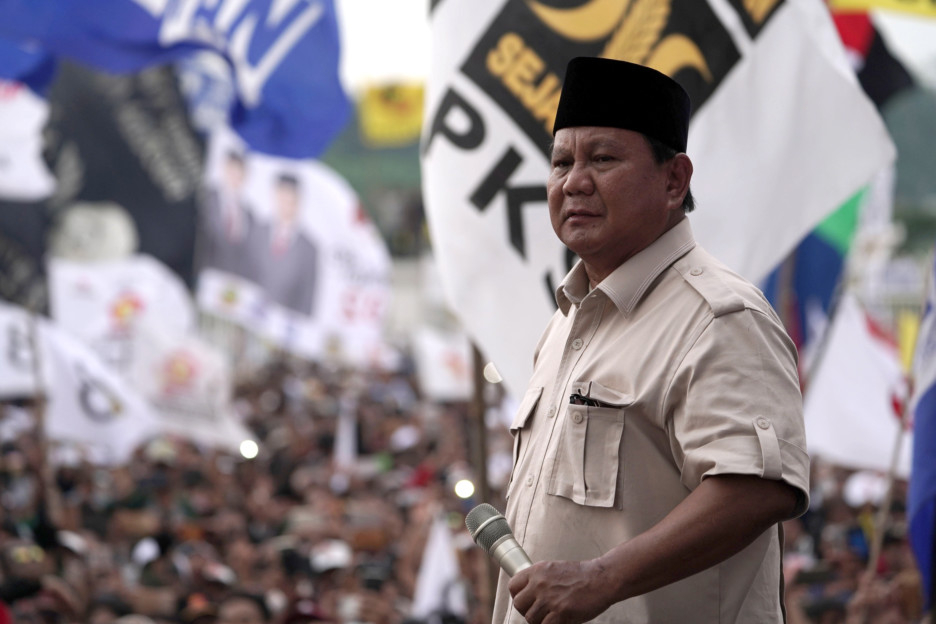
Five years ago he was south-east Asia’s democratic poster boy, Indonesia’s Obama. His face plastered across Time magazine with three words: A New Hope.
When Joko Widodo, or “Jokowi”, was elected president of one of the only true remaining democracies in the region it was a moment of triumphant vindication — proof that outliers could trump an entrenched oligarchy, that an ordinary Indonesian could make it.
A wildly popular politician, Jokowi’s rapid rise from successful furniture entrepreneur to beloved small-town mayor, reform-minded Jakarta governor and ultimately the president, was something of a political fairytale for Indonesia’s young democracy.
The hype was even more exaggerated because of the stark contrast to his opponent, Prabowo Subianto. A former military general accused of human rights abuses and the former son-in-law of dictatorial ruler Suharto, Prabowo epitomised the autocratic old guard, still vying for power decades on.
Fast forward five years and Jokowi and Prabowo will again compete for the presidency of the world’s third-largest democracy on April 17, but this time the mood is vastly different.
With the rights of LGBT and some religious minorities plummeting, a series of arrests raising alarm bells over freedom of expression, questions about the neutrality of the police and plans for military encroachment on civil space, the notion that Jokowi is a paean of democratic progress has been steadily undermined.
The executions, for one, were an ominous start.
Within two months of taking office in 2014 the new president unexpectedly signed off on a round of capital punishment, citing questionable data to justify his claim Indonesia was in the throes of a “drug emergency” — a shock move from a leader seen as the best hope in decades to resolve a pandora’s box of past rights abuses.

Despite months of international outcry, eight drug offenders, including two Australians, were executed by firing squad in April 2015.
Analysts said that if Jokowi had offered clemency, he would have been seen to be bowing to international pressure — political capital he was at the time unwilling, or unable, to squander.
Elected with popular support but a minority in parliament (and no prior experience in national politics), Jokowi needed to bolster his tenuous position early on and that meant playing ball with the old guard.
For a candidate once celebrated for having no military ties, Jokowi soon had a cabinet and inner circle featuring several Suharto-era military men. Among the most controversial members is coordinating security minister Wiranto, a former general accused of war crimes.
Haris Azhar, an activist who has spent the several years calling on the president to uphold his promise to resolve past rights abuses, won’t be voting this year.
“Our democracy has no meaning, no substance, any more,” he says.
On the streets though , Jokowi still commands widespread support and in the polls he is more than 15 points in front of Prabowo.
“Jokowi works hard, all the way from Sabang to Meruake, and is he honest. The others are corrupt,” says Mery, 65, from her fried tofu stall in Jakarta’s south.
“We can already see his performance in the field,” agrees 28-year-old Achmad, a nearby chicken soup vendor. “Jokowi has built roads and schools, there is evidence of that.”
In the past four years the president has indeed embarked on a zealous and much-needed infrastructure drive, building thousands of kilometres of road, almost a dozen airports and numerous other ports, dams and bridges.
Voters also point to his investment in the national health insurance scheme and education for the poor. But that is only part of the picture.
Jokowi’s campaign tagline this year is “Indonesia maju” meaning “Indonesia advancing” — but many political analysts wonder: advancing to where?
Described by one analyst as an “ideological blank slate”, Jokowi has shown himself to be less a visionary leader than a technocratic doer, prioritising economic and social rights as other democratic freedoms cop a beating.
The March arrest of a sociology professor after he sang a famous song critical of the military — in protest over a Suharto-esque plan to move military officers into civil institutions, sent a chilling sign. To Indonesia’s dynamic civil society, the arrest and subsequent charges sparked fears that democratic freedoms, hard won since the fall of Suharto, were now under threat.
It is the latest in what some see as a perturbing trend, with a coterie of opposition figures arrested, charged and in a few cases jailed in the past two years, concerns have been raised that Indonesian police are becoming increasingly partisan — a charge the government denies.
Leading up to this election the police have blocked several “ganti president” or “change the president” rallies, citing security or regulatory reasons — helping to stymie opposition momentum.
“I think there is enough of a pattern of behaviour now to say that the politicisation of law enforcement has been taken to a new level under Jokowi,” notes Liam Gammon, a PhD candidate at the Australian National University, “And there are some pretty worrying trends in the way that it appears law enforcement is being used and by that I mean some very questionable investigation of prominent opposition figures.”
Analysts also point to the revised law on mass organisations, signed by Jokowi in 2017 to ban hardline group Hizbut Tahrir. The fear is how it could be used next.
At a time when the world’s largest Muslim-majority nation is being shaped by an increasingly illiberal zeitgeist, and the growing influence of Islam on the political sphere, the president has had to make some hard decisions. And while he has not proactively abused minority rights, he has been accused of doing little to defend them.
As countries from Australia to Argentina legalise same-sex marriage, LGBT rights have taken a steep dive under Jokowi, with Indonesia’s national psychiatric association classifying homosexuality as a mental disorder, and the defence minister famously declaring LGBT people a threat “more dangerous than nuclear warfare”. Amid growing violent attacks and vitriol, last year the parliament debated whether to finally outlaw gay sex.
“It is getting worse,” says Andreas Harsono, from Human Rights Watch, “Jokowi doesn’t spend adequate political capital to better Indonesia’s democracy, including religious freedoms and civil liberties.”
Harsono says that Jokowi has failed to stem a rising tide of religious intolerance, a trend that emerged under his predecessor, meaning dubious criminalisation has continued.
Last year a Buddhist woman in Sumatra was jailed for 18 months for blasphemy after she complained about a noisy mosque. In 2017 “Ahok”, Jakarta’s former Christian governor, was imprisoned for two years after referencing the Quran.
‘Taking it for granted’
Tellingly, there has been limited uproar from some liberal elites over the perceived authoritarian creep, overwhelmingly because they fear criticising Jokowi could empower his opponent. Prabowo was allegedly involved in the kidnapping and torture of pro-democracy activists in 1998, a claim he has consistently denied. He was later dismissed from the army.
Prabowo, a former special forces commander and son of a Suharto-era economics minister, has softened his image of late — there is now an Instagram account for his cat Bobby, in which he occasionally features. But Prabowo has courted Islamic hardliners, reportedly signing a pact to promote a conservative Islamic agenda if he wins.
Jokowi has similarly sought to boost his Islamic credentials. He controversially chose Ma’ruf Amin — a deeply conservative Islamic leader who has supported fatwas against LGBT, religious minorities and yoga — as his running mate.
Facing a choice between Jokowi and Prabowo, some have vowed to “golput”, or not vote at all — a position that for many would have been unthinkable in the last election between the same two men.
If Jokowi does win Indonesia looks set to benefit from better infrastructure and social welfare, says ANU’s Liam Gammon, but the question is at what cost.
“What does that really mean if Jokowi has facilitated the decay of Indonesian institutions,” he says, “Or if he has normalised some really anti-democratic behaviours?”
As a beneficiary of Indonesian democracy, analyst Dewi Anwar Fortuna, says the president may have underestimated the imperative to defend it. “Without Indonesia’s democratic state someone like Jokowi would not have been able to become president,” says Fortuna. “I got a feeling he is taking it for granted.”
–Guardian News & Media Ltd












